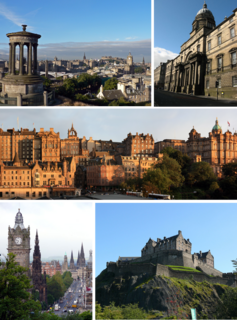Marianus Scotus was an Irish monk and chronicler.

John Boyle, 5th Earl of Cork and 5th Earl of Orrery, FRS was a writer and a friend of Jonathan Swift, Alexander Pope and Samuel Johnson.

John Nisbet, Lord Dirleton was a Scottish judge.
Sir James Dalrymple, 1st Baronet was a Scottish writer who served as the Principal Clerk of Session. He was the son of the jurist James Dalrymple, 1st Viscount Stair (1619–1695). He is known as contributing to the debate over the Union between England and Scotland with his Collections Concerning the Scottish History (1705)
David Panter [also written Painter, or Paniter], Scottish diplomat, clerk and bishop of Ross, was the illegitimate son of Patrick Paniter, secretary to James IV; his mother was Margaret Crichton, illegitimate daughter of William Crichton, 3rd Lord Crichton and widow countess of Rothes.
Theodore Goulston M.D. (1572–1632) was an English physician, scholar, and founder of the Goulstonian Lectures.
Marianus is a male name, formerly an Ancient Roman family name, derived from Marius. Marianus may refer to:
Adam of Barking, was a Benedictine monk and religious poet who left a number of writings including De Serie Sex Ætatum which runs to 15,000 lines of hexameter. He belonged to the abbey of Sherborne in Dorset.
John Shower (1657–1715) was a prominent English nonconformist minister.
Laurence William York, O.S.B., was a Roman Catholic prelate who served as the Apostolic Vicariate of the Western District from 1750 to 1770.
James Smith (1645–1711) was an English Roman Catholic prelate, Vicar-Apostolic of the Northern District under James II of England.
Henry Stebbing (1687–1763) was an English churchman and controversialist, who became archdeacon of Wilts.
Richard Bromsgrove, was a monk of the Benedictine abbey of Evesham.
William Sherwin (1607–c.1687) was an English minister. He acted as lecturer or assistant to the Rev Josias Byrd, the Rector at the church of St Mary the Virgin at Baldock.
John Genest (1764–1839) was an English clergyman and theatre historian.
John Gillies (1712–1796) was a Church of Scotland minister and theological writer.
Clement Reyner D.D. (1589–1651) was an English Benedictine monk, who became abbot of Lamspringe in Germany.
Rev David Dickson DD (1780–1842) was a Scottish presbyterian minister and writer.
Daniel Bellamy, the elder was an English miscellaneous writer. The son of Daniel Bellamy, scrivener of London, he was born in the parish of St. Alartin's, Ironmonger's Lane, on 25 December 1687. He entered Merchant Taylors' School on 12 March 1702, and matriculated as a commoner of St. John's College, Oxford, on 4 March 1706. In consequence of a reverse of fortune he was forced to leave Oxford without taking a degree in 1709, and became a conveyancer's clerk.




